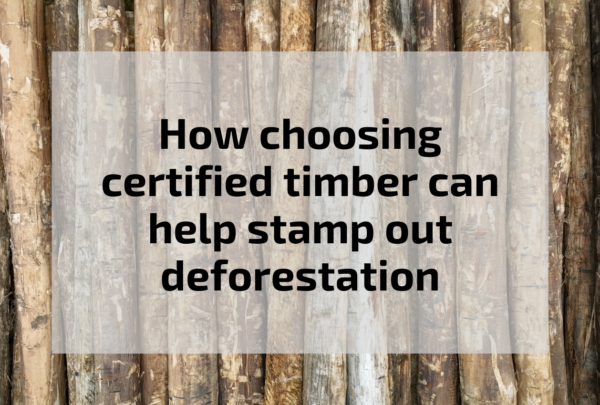Deforestation is a global crisis with far reaching impacts on our planet. Choosing timber products that have been third party verified as sustainable is one way to ensure the products you seek are not a result of deforestation or poor logging practices.
Sustainable use of natural forests, as stated by the Food and Agriculture Organization of the United Nations (FAO), is considered a key step toward a sustainable economy.¹
Deforestation, however, as defined by the United Nations, is “the permanent reduction of the tree canopy cover below the minimum 10% threshold. It also includes areas of forest converted to agriculture, pasture, water reservoirs, mining and urban areas. The term specifically excludes areas where the trees have been removed as a result of harvesting or logging, and where the forest is expected to regenerate naturally or with the aid of silvicultural measures”.²
Deforestation essentially changes the purpose of the land use. The term “logging” is sometimes incorrectly associated with deforestation. Sustainably and properly managed tree harvesting (or logging) within forests that have been certified and overseen by independent protection bodies is not deforestation.
Responsible Wood (RW), which sets out Australian Standard AS/NZS 4708-2021 (Sustainable Forest Management) has in place stringent requirements for upholding these standards and ensures the harvesting of forest products involves carefully planned and controlled activities including active regeneration and monitoring, preventing both deforestation and forest degradation.
In response to some environmental non-government organisations commentary around deforestation, RW released this helpful document which explains:
“In an era marked by environmental consciousness, the impacts of climate change and concerns about deforestation and forest degradation, we have prepared this statement to outline our commitment to developing globally recognised standards for the certification of sustainably managed forests. It is imperative to dispel the common misconception that certified forests, (the harvesting of trees) equates to deforestation and forest degradation. Rather, through the Responsible Wood Certification Scheme (RWCS) we promote the implementation of forest management practices that prioritise the longevity and health of forests.
The standard AS/NZS 4708-2021- Sustainable Forest Management has been developed through an open process of consultation and consensus in accordance with international norms, which contains clearly defined cultural, economic, environmental, and social criteria and indicators in line with established environmental management systems such as AS/NZS ISO 14001:2016, the Montreal Process criteria and indicators, and the Programme for the Endorsement of Forest Certification (PEFC) standard for sustainable forest management (PEFC ST 1003:2018).”³
The objectives for applying ISO14001 to the forestry field is to factor in criteria related to sustainable forest management, to the ISO14001 environmental management standard and to promote continuous improvement of environmental loads for forest management.⁴
Certification to PEFC provides “forest owners with an incentive to manage their forests responsibly, while giving companies a tool to ensure their procurement of forest-based products is not contributing to the loss of the world’s forests”.⁵
These schemes are two of the highest and most credible independent and internationally recognised certifications an organisation can hold to be recognised as responsible and sustainable wood manufacturers.
Always look for third party accreditation to have confidence in companies making claims relating to deforestation or sustainability, and that they are backed by the correct and relevant certifications. Be conscious that some eNGOs claims are, by their own admission, not third party certified nor in-line with definitions of deforestation in accordance with the FAO, The UN, the PEFC, AS4708 or ISO14001.
As leaders of innovative timber supply in Australia, ASH strongly promote and endorse the use of transparent, verified, third party certification schemes.
ASH are proudly third party audited and accredited to ISO14001, PEFC and RW.

1. Sustainable Wood for a Sustainable Future – Food and Agriculture Organization of the United Nations
2. Deforestation – United Nations Office for Disaster Risk Reduction
3. Statement on Deforestation and Forest Degradation – Responsible Wood
4. Latest trends of ISO in the field of forestry management and related industries – Institute for Global Environmental Strategies
5. Working together to tackle deforestation – the Programme for the Endorsement of Forest Certification
"*" indicates required fields
